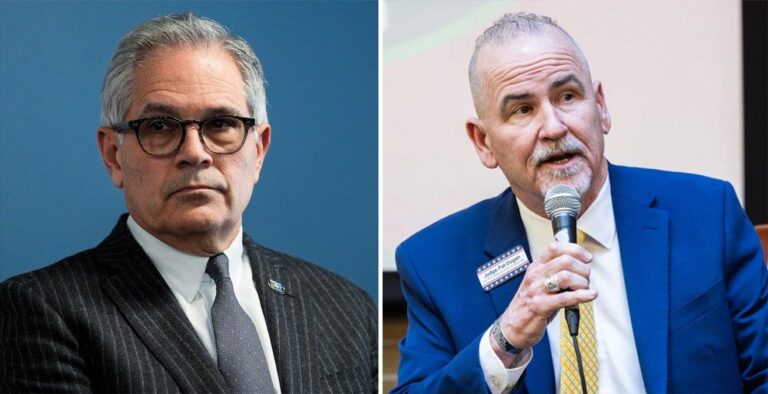Philadelphia DAŌĆÖs Judicial Endorsements Ignite Ethical Controversy
Philadelphia District Attorney Larry KrasnerŌĆÖs recent public backing of certain judicial candidates has sparked intense debate across the cityŌĆÖs legal and political arenas. While advocates praise this as a proactive step toward promoting judges aligned with progressive justice reforms, critics warn it risks compromising the impartiality expected from the prosecutorial office. This controversy underscores the delicate balance between wielding prosecutorial influence and preserving the independence of the judiciary, raising concerns about potential conflicts of interest and the integrity of upcoming judicial elections.
Proponents argue that the DAŌĆÖs endorsements serve as a transparent effort to elevate candidates committed to fairness and systemic reform. Conversely, detractors highlight several risks associated with this practice, including:
- Political partiality: Endorsements may prioritize political alignment over judicial qualifications.
- Voter influence concerns: The public might perceive judicial candidates as beholden to prosecutorial power.
- Judicial independence at risk: Long-term erosion of unbiased decision-making could result from such entanglements.
| Stakeholder | Main Argument | Potential Effect |
|---|---|---|
| Supporters | Facilitates election of reform-oriented judges | Strengthens accountability within the justice system |
| Opponents | Jeopardizes judicial neutrality | Undermines public confidence in courts |
How DA Endorsements Affect Judicial Neutrality and Public Trust
The involvement of PhiladelphiaŌĆÖs District Attorney in endorsing judicial candidates has intensified concerns about maintaining judicial neutrality. Critics emphasize that when a high-ranking prosecutor publicly supports certain judges, it risks blurring the lines between the executive and judicial branches, potentially influencing rulings in cases involving the DAŌĆÖs office. This perceived partiality can extend beyond individual cases, shaking the communityŌĆÖs faith in the fairness of the entire legal system.
Public confidence in the judiciary depends heavily on the belief that judges operate independently, free from political or prosecutorial pressures. The DAŌĆÖs endorsements have raised several apprehensions, such as:
- Conflict of interest possibilities: Judges endorsed by the DA might feel implicit pressure to rule favorably in prosecutions led by the office.
- Unequal electoral competition: Candidates lacking high-profile endorsements face significant disadvantages in judicial races.
- Heightened public skepticism: Voters may doubt whether justice is administered impartially or influenced by political alliances.
| Area of Impact | Possible Outcomes |
|---|---|
| Judicial Rulings | Increased perception of bias and partiality |
| Public Opinion | Decline in trust toward judicial fairness |
| Election Fairness | Compromised merit-based candidate evaluation |
Legal Insights on ProsecutorsŌĆÖ Political Endorsements
Legal scholars and ethics experts have expressed diverse viewpoints regarding the DAŌĆÖs public endorsements of judicial candidates, highlighting the nuanced challenges at the crossroads of legal ethics and political participation. Critics caution that such endorsements may erode the impartiality essential to the justice system and diminish public trust. Ethical standards from professional legal organizations stress that prosecutors must avoid any appearance of political favoritism, a principle potentially compromised when endorsing judges who might later preside over cases involving the DAŌĆÖs office.
On the other hand, defenders argue that as elected officials, district attorneys retain the right to engage in political activities, including endorsements, akin to private citizens. Nonetheless, they emphasize the necessity of clear ethical boundaries to prevent conflicts of interest. The table below summarizes key expert opinions gathered from recent legal forums and commentaries:
| Dimension | Expert Opinion | Consequences |
|---|---|---|
| Political Expression | Protected right but must be balanced with official duties | Risk of perceived partiality |
| Ethical Limits | Require strict separation from prosecutorial discretion | Preserves justice system credibility |
| Public Confidence | Vital to maintain trust in judicial fairness | Potential harm to officeŌĆÖs reputation |
- Transparency regarding the reasons behind endorsements can alleviate ethical concerns.
- Developing internal guidelines can assist prosecutors in navigating political involvement responsibly.
- Ongoing collaboration with ethics commissions is recommended to refine advocacy standards.
Strategies to Safeguard Ethical Integrity in Judicial Endorsements
To reinforce public confidence and protect the judiciaryŌĆÖs independence, it is imperative to establish clear policies that restrict district attorneys and other executive officials from publicly endorsing judicial candidates. Such measures would help maintain a firewall between political influence and judicial decision-making. Additionally, implementing transparent disclosure requirements for any indirect support or campaign contributions related to judicial elections would enhance accountability.
Key recommendations include:
- Mandatory ethics education focusing on judicial impartiality and conflict of interest prevention
- Formation of an independent oversight body to monitor endorsements and campaign conduct
- Enforcement of penalties for violations of judicial election ethics
- Community outreach initiatives to raise awareness about the importance of an unbiased judiciary
| Initiative | Objective | Anticipated Result |
|---|---|---|
| Ethics Training | Educate officials on appropriate political conduct | Minimize conflicts of interest |
| Oversight Committee | Supervise endorsements and ensure compliance | Enhance transparency and accountability |
| Disclosure Policies | Reveal political influences in judicial races | Strengthen public trust |
| Public Education | Inform voters about judicial independence | Boost civic participation and awareness |
Looking Ahead: The Future of Judicial Endorsements in Philadelphia
As the Philadelphia District AttorneyŌĆÖs endorsements continue to draw scrutiny from legal experts, ethics watchdogs, and the public, the debate over the appropriate role of political influence in judicial elections remains unresolved. Observers will closely monitor how these developments affect public trust in the cityŌĆÖs legal institutions and whether they catalyze reforms to clarify ethical boundaries. The ongoing conversation about balancing prosecutorial advocacy with judicial independence will significantly shape the trajectory of PhiladelphiaŌĆÖs justice system in the years to come.








